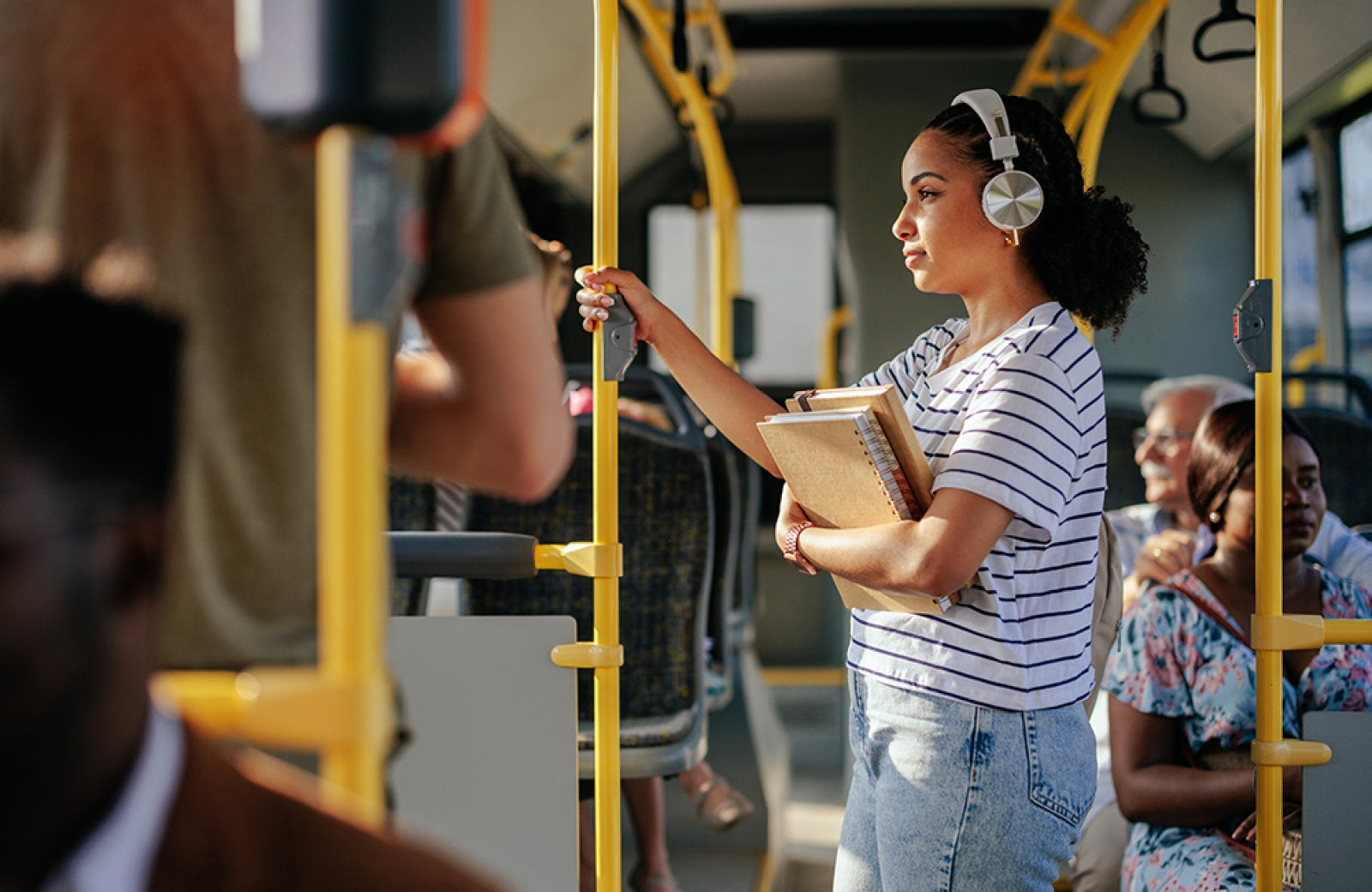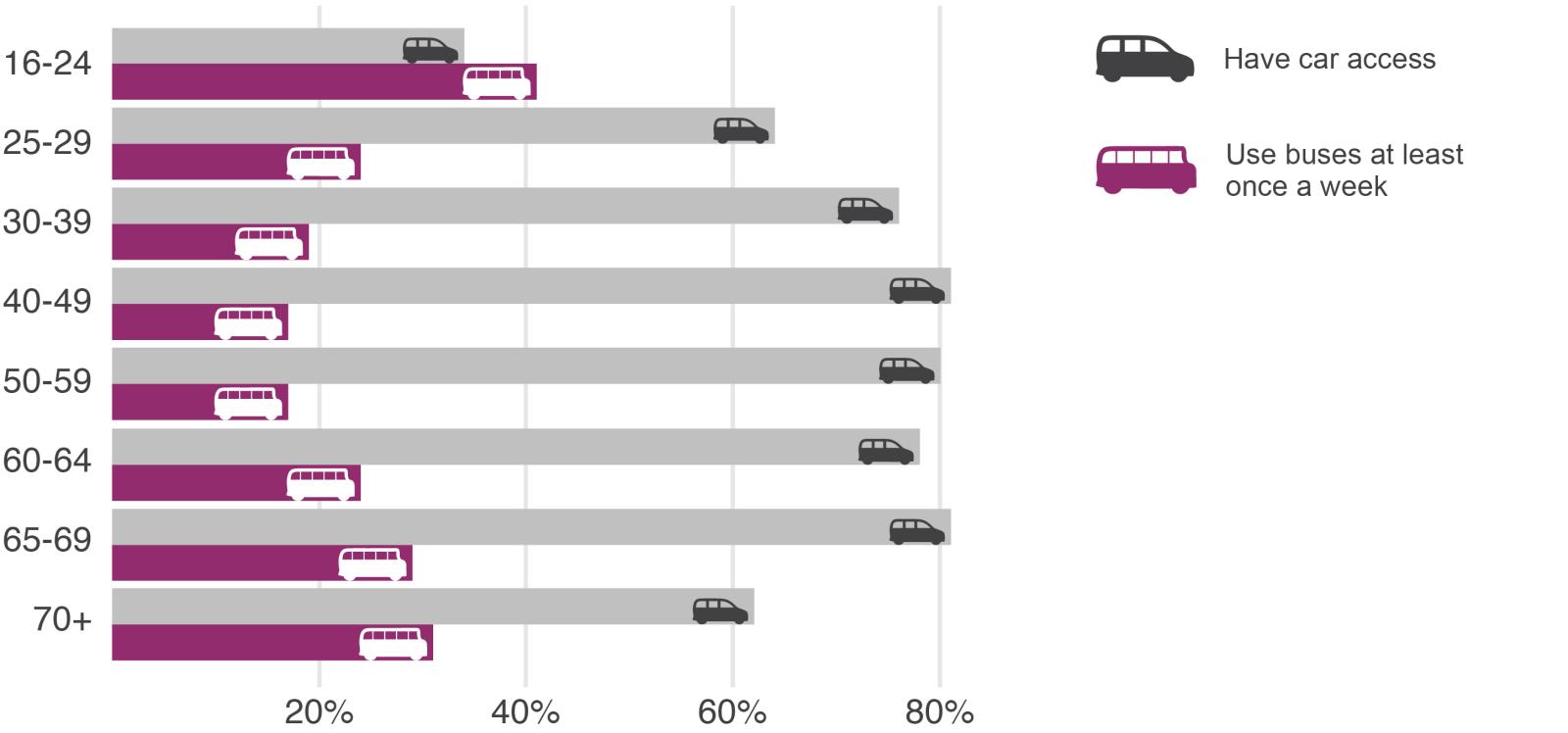“If you want to get outside, you’re gonna have to use a bus”- Stories on how the bus is a lifeline for many young adults

Over two in five 16 to 24-year-olds use buses every week and two out of three young people in this age group do not have access to a car. These are the highest rates of bus use and lowest rates of car access of all age groups (see Figure 1).
Yet the experiences of young adults are less scrutinised in transport policy and research compared to older people and children.
In Summer 2022, we, at the University of the West of England (UWE Bristol), carried out in-depth interviews with young people aged 17 and 18 years.
We wanted to understand the role that transport played as they navigated a pivotal moment: leaving compulsory education. At the heart of many of their experiences were public buses.
In this blog, we share four of their stories. Their experiences show how buses are instrumental for them reaching education, employment and building life-skills as they take their first steps in adulthood.
Note: we have changed the names of the young people to protect their identity.

Buses connect young people living outside urban centres to employment
Myra, from a small town eight miles from Nottingham.
“If you want to get outside, you’re gonna have to use a bus.
“I was finishing my sixth form, I was like, ‘D’ya know what, I need to find something to do because I need to save up for uni…I also found out that student finance is not really giving me a lot.
“So I started to apply for jobs left, right and centre…it was just like getting on buses, getting on trams. I literally lived, and I still do kinda live on the bus. I spend more time on a bus than I’m in my house.”
Myra also spoke about barriers to employment when public transport wasn’t available.
“There was this really good job that was paying me way more than where I’m working now... The fact is, the bus system don’t even run early in the morning…I was trying to find a way around it but it just wasn’t working… it was really emotional…I couldn’t get to that job.”
Zala, from South Bristol.
Without a household car, buses have allowed Zala to access opportunities important for her career ambitions in engineering.
“Getting the bus [to secondary school]…that was the only way of getting there really.
“I volunteered at Aerospace, which is a museum…I was getting a bus up there. Very long. Like two hours but it was useful.
“I started because I wanted to get involved with the aerospace industry… a lot of the other volunteers were ex-engineers or ex pilots…it reassured me that, that was what I definitely was interested in.
“I was always pretty stuck on doing [an] apprenticeship [after leaving sixth-form] because I like how it incorporates both hands on and also learning… I’ve been accepted [to a scheme in north Bristol].
“The plan was to get my driving licence…I don’t know if I’m going to have enough time to do that…if not, then I’ll probably get the bus.”
Buses have helped Zala access part-time work which has, in turn, helped her with important life-skills.
“I’ve got a job at the moment…part time…. just [for] money really and experience… It looks good on your CV…[I] get the bus most of the way and then I walk for about 10/15 minutes.
“I’m just front of house… selling tickets and chatting to people, that sort of thing…. I haven’t been the most confident person in general. So that definitely brought me out of myself.”
Affordable, reliable buses support social connections and enhance life-skills
Aisha, from Greater Manchester
Aisha has benefited from free bus travel offered to 16 to 18-year-olds across Greater Manchester.
“I’ve been getting the bus for seven years – I’ve just grown to like the bus – most of my school life has been on the bus – most of the drama happens on the bus. Most of my homework and studying – and revision – happens on the bus!
“…a lot of my school friendships have started on the bus.
“For me, to be able to travel independently – it’s crucial. I think there’s some skills that take place that you learn on the bus journey that apply to other parts of your life.
“I’ve noticed the difference between people who can travel on the bus and those who can’t. When I meet people who get on the bus for the first time, they have a lot of social anxiety – like, being able to talk to the bus driver and being able to pay.”

Conversely, unreliable and infrequent services can limit young people’s opportunities
Joshua, from Cornwall.
“The bus takes so long to get to where I'm going. I want to go to St. Austell, and it goes all around everywhere, it takes about an hour and a half to get there, when in a car it takes 20 minutes.
"[At age 16] I had [a college offer] from St. Austell…I could have done Sport and Cooking, which I did like, but I didn't really like the idea of getting up really early for the class and it is taking forever to get there. So, I just put it off and stayed local.”
Joshua aims to find an apprenticeship after he leaves school and anticipates using the bus to get there.
“[With] more frequent buses I’d maybe consider going further afield if the times were a lot more flexible, and more frequent. It would widen my job opportunities, I think, if that happened.”
Inadequate bus services are motivating Joshua to want to drive.
“A bus every hour…that’s quite a long wait….so I’ll maybe think about in the future picking up driving… so I can go whenever I feel like I want to go.”
What’s next?
The stories told in this blog bring to life the crucial role that buses play in young people’s mobility and personal development.
This applies to young people living in households with a car, as well as those in households without a car. Young people in households with a car spoke about their desire for autonomy and parents’ limited availability to give them lifts, as well as not wanting to be a burden to them.
Their stories highlight what could be at stake for young people if local bus services do not provide a suitable alternative to the car. This includes:
- reducing access to employment and education
- widening gaps between young people in different regions of the UK and from different economic groups
- further limiting already strained options for mobility, particularly for those living in rural areas or on the fringes of urban areas
- decreasing opportunities for socialising or personal development
- increasing impetus for young people learning to drive.
These are all at odds with wider government priorities to level up, improve economic engagement and decrease loneliness. Increased car dependency would also jeopardise climate, air quality. health and safety ambitions.
A thriving bus network on the other hand helps young people to thrive as they move into adulthood. However, ambitions to transform the bus network are diminishing. Inadequate public transport should not be a risk factor for young people’s prospects.
Dr Sarah Collings is a Senior Research Fellow in Transport and Young People at the University of the West of England
Further reading
- Fair bus fares for young people: a policy briefing assessing bus fares support for young people across the UK
- The role of transport in supporting a healthy future for young people - Sustrans.org.uk
About the research
The ‘bus stories’ told in this blog were collected as part of the Transport to Thrive project by UWE Bristol in partnership with Sustrans.
Transport to Thrive aims to make the policy case for transport that better enables young people aged 16-24 to make journeys and reach opportunities.
Transport to Thrive is part of the Health Foundation’s Young People’s Future Health Inquiry. The Health Foundation is an independent charity committed to bringing about better health and health care for people in the UK.
UTG's Rebecca Fuller sits on the Advisory Board for the project.
References
Chatterjee19a Chatterjee, K., Clark, B., Nguyen, A., Wishart, R., Gallop, K., Smith, N., & Tipping, S. (2019). Access to transport and life opportunities. Department for Transport https://uwe-repository.worktribe.com/output/4274794/access-to-transport-and-life-opportunities
Collings22 Collings, S., Chatterjee, K., & Cope, A. (2022). Fair bus fares for young people: A policy briefing assessing bus fare support for young people across the UK. Bristol: UWE Bristol.

